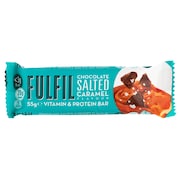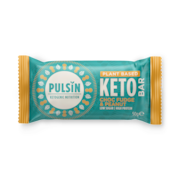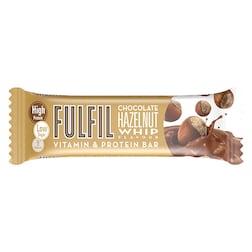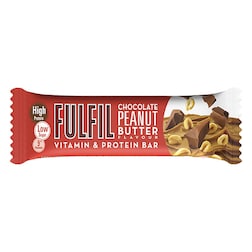15% off £30 or 20% off £40
Code:SHOP
High-protein snacks: the best protein bars

Discover the potential benefits of a high-protein diet, get some high-protein snack ideas and find out which protein bars come out top
Our top 3 picks
Low sugar diet

Grenade
Grenade Peanut Nutter Protein Bar 60g
£2.85
Low sugar diet

Fulfil
Chocolate Salted Caramel Bar 55g
25% off
£2.13
£2.85
Vegan

Pulsin
Pulsin Choc Fudge & Peanut Keto Bar 50g
Great Savings
£1.50
£2.20
Protein is a vital component of any diet. It’s importance often emphasised for people who have a high activity level, but it’s essential for the maintenance of optimal health whether you do a lot of exercise or not.1
This is because it serves many important functions within the human body, from making new cells and repairing the old, to supporting muscle development and providing energy. Experts believe these functions are vital for pretty much everything – whether you want to support your recovery from exercise, prevent muscle wastage or recover from surgery.1,2
The recommended daily intake of protein varies from person to person depending on several factors such as age, gender, activity level and overall health goals.1 But whatever your intention, making sure you get enough protein can have its benefits.
Keep reading for some easy ways to help add protein to your diet, including our favourite protein bars.
What is a high-protein diet?
A high-protein diet is one in which you get a significant portion of your daily calories from protein-rich foods, such as eggs, beans, meat, dairy, fish and tofu.3
High-protein diets typically mean getting a higher percentage of your total daily calories from protein sources than dietary guidelines usually advise. The guidelines generally recommend around 0.8–1g of protein per kg of body weight per day.4,5 For example, a 60kg adult would need 48–60g of protein per day.6
Because protein supports muscle growth and repair,1,2 high-protein diets are often popular and recommended among athletes.4 They may be suggested for other reasons too; for example, older people are recommended to eat between 1–1.5g of protein per kg of body weight to help support their ability to fight infection and promote wound healing.2
There’s a bit of a discussion around how much protein athletes need in their diets. Previously, it was thought that they didn’t need more than the standard guidelines. However, research now suggests that athletes might benefit from eating 1.4 to 1.8kg of protein per body weight per day.4
If you want to follow a high-protein diet, you would need to eat more than your recommended daily amount but make sure to consult with a medical professional or dietician first.
Some well-known high-protein diets include:
- Atkins diet
- Stillman diet
- paleo diet
- zone diet
- Dukan diet
- ketogenic diet
High-protein snacks
High-protein snacks are a great option if you’re looking to increase your protein intake. This is especially important if you’re an athlete engaged in intense training.4
With a load of convenient, high-protein snacks to choose from, you can fuel your body with the protein it needs on-the-go, in between workouts.
Whatever your reason for wanting to increase your protein intake, here are some delicious and nutritious healthy protein snack ideas:
- protein bars – the easiest option of them all, just reach into your cupboard and grab a protein bar specially formulated to help increase your protein intake7
- greek yoghurt with berries – greek yoghurt is an excellent source of protein, and when paired with fresh berries, it becomes a delicious snack2
- hard-boiled eggs – these are a great portable and protein-rich snack. Boil a few at a time so you can just reach into the fridge when you need one2
- edamame – boiled, steamed or roasted edamame is a delicious and protein-rich snack8
- roasted chickpeas – toss canned chickpeas with a little olive oil and seasonings, then roast them in the oven for a crunchy, high-protein snack9
- protein smoothies – blend together plant-based protein powder, fruits and low-fat dairy alternative drinks for a creamy and protein-rich smoothie
- apple with nut butter – this one’s easy – simply just slice up an apple and dip it in a nut butter of your choice – full of protein and delicious2
- tofu bites – cut firm tofu into bite-sized pieces, marinate them in a tasty sauce (like soy sauce, teriyaki or BBQ), and bake or air-fry until lightly crispy2
- energy balls – mix oats, nut butter, chia seeds, ground flaxseeds and a sweetener like maple syrup or dates. Form into small balls and refrigerate for a protein-rich and energising snack
- nut butter on rice cakes – spread almond, peanut, or cashew butter on rice cakes for a satisfying and protein-packed snack2
Why choose protein bars?
In a modern world where everyone is on the go constantly, while also trying to get to the gym, see friends and family, and take care of their nutritional needs, the market demand for protein bars is increasing.10
This is because protein bars are a convenient and portable source of protein that you don’t have to prepare in advance. They also come in plenty of different variations. You can go low-carb, if that’s what you’re looking for, or high in natural carbohydrates if you need the energy to fuel your workouts.11
If you fancy it, you can even make your own homemade protein bars with just a few simple ingredients. Take a look at this protein bar recipe for ideas.
Our top protein bars
There are so many innovative, protein-packed and downright delicious protein bars on the market now that you can be sure you’ll find the one (or few) that works for you.
Here are some of our favourite high-protein bars to help you perform at your best.
Grenade protein bars really do live up to the hype. With around 20g of protein per bar (depending on flavour) and only 1.7g of sugar, it’s entirely understandable why they’re so popular.
Ever wondered if someone could make a bar with a creamy hazelnut centre while still being low in sugar? Well, now they have. Plus, one bar contains 30% of the recommended daily allowance of nine vitamins and gives you 19g of protein.
Containing MCT, a ketone-boosting fat, crunchy peanuts and no added sugar chocolate chips, this tasty bar delivers 13g of plant-based protein.
This tasty bar is high in protein and low in sugar with added protein for slow energy release to help you get through even the most jam-packed of days. Plus, it’s packed with 20g of carbs, 21g of protein and 1.0g of sugar.
Fulfil protein bars manage to be extremely indulgent. This bar in particular has a silky peanut butter centre, while containing 20g of protein and only 206 kcal.
This low-sugar protein bar is packed with nine vitamins and 20g of protein. Take a bite of a crunchy, milk chocolate coating, surrounding a soft, silky salted caramel centre. Delicious!
The final say
Whether you’re looking to build muscle or recover from illness, protein is a vital component of a healthy diet.1 So, whatever your motivation for boosting your protein intake, high-protein snacks, including protein bars, can be a convenient way to meet your nutritional goals.
However, if you’re thinking of adding more protein to your diet, it’s a good idea to speak to a healthcare professional who can give you personalised dietary advice.
The advice in this article is for information only and shouldn’t replace medical care. While we strive for accuracy and balance, please be aware that this article may discuss products available for purchase through Holland & Barrett. Please check with your GP or healthcare professional before trying any supplements, treatments or remedies. Food supplements mustn’t be used as a substitute for a varied and balanced diet and a healthy lifestyle.
- Carbone JW, et al. ‘Dietary protein and muscle mass: Translating science to application and health benefit.’ Nutrients. 2019;11(5):1136. Available from: https://doi.org/10.3390/nu11051136
- NHS. The importance of protein in your diet [Internet]. [Cited 2024 Apr 15]. Available from: https://www.berkshirehealthcare.nhs.uk/media/109513434/importance-of-protein-in-diet-bhp220.pdf
- NHS. Eating a Balanced Diet [Internet]. [Cited 2024 Apr 15]. Available from: https://www.nhs.uk/live-well/eat-well/how-to-eat-a-balanced-diet/eating-a-balanced-diet/
- Kerksick CM, Wilborn CD, Roberts MD, Smith-Ryan A, Kleiner SM, Jäger R, et al. ISSN exercise & sports nutrition review update: research & recommendations. Journal of the International Society of Sports Nutrition. 2018 Aug 1;15(1). Available from: https://doi.org/10.1186%2Fs12970-018-0242-y
- Wu G. Dietary Protein Intake and Human Health. Food & Function. 2016 Jan 11;7(3):1251–65. Available from: https://pubs.rsc.org/en/content/articlelanding/2016/FO/C5FO01530H
- British Heart Foundation. How much protein should I eat to gain muscle [Internet]. Bhf.org.uk. British Heart Foundation; 2023 [cited 2024 Jul 19]. Available from: https://www.bhf.org.uk/informationsupport/heart-matters-magazine/nutrition/ask-the-expert/how-much-protein-should-i-eat-to-gain-muscle
- Jovanov P, et al. ‘High-Protein Bar as a Meal Replacement in Elite Sports Nutrition: A Pilot Study.’ Foods. 2021;10(11):2628. https://doi.org/10.3390/foods10112628
- Talukdar, A, et al. ‘Edamame: A rich source of protein for human nutrition’. Indian Farming. 2019; 69(10):18-20. Available at: https://epubs.icar.org.in/index.php/IndFarm/article/view/96998
- Begum N, Qudrat Ullah Khan, Liu LG, Li W, Liu D, Ijaz Ul Haq. Nutritional composition, health benefits and bio-active compounds of chickpea (Cicer arietinum L.). Frontiers in nutrition [Internet]. 2023 Sep 28 [cited 2024 Jul 19];10. Available from: https://www.ncbi.nlm.nih.gov/pmc/articles/PMC10580981/
- Wu G. ‘Dietary Protein Intake and Human Health.’ Food & Function. 2016;7:1251–65. Available from: https://doi.org/10.1039/c5fo01530h
- Mul JD, et al. ‘Chapter Two - Exercise and Regulation of Carbohydrate Metabolism.’ Progress in Molecular Biology and Translational Science.2015;135:17-37. Available from: https://www.sciencedirect.com/science/article/abs/pii/S1877117315001520




















